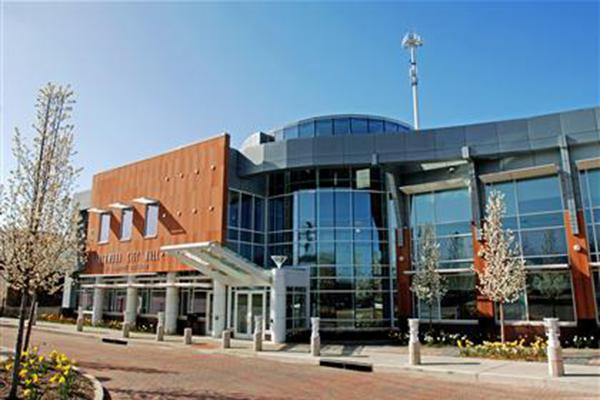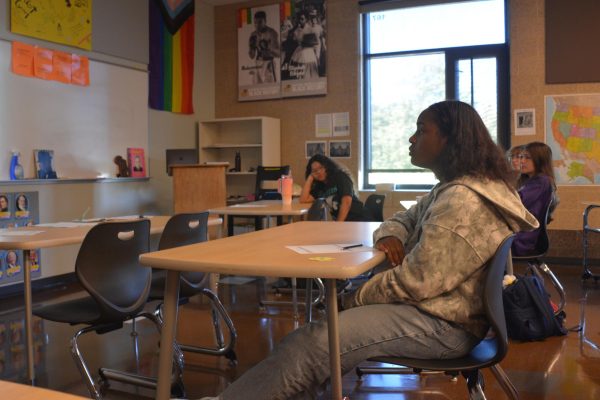Beachwood Community Affected by Trump’s Travel Ban

Image from Beachcomber archives
President Trump’s executive order on Muslim immigration might have felt like something happening far from the Beachwood community, but it did impact some residents.
In an e-mail sent out to students, staff and parents on Jan 30, Superintendent Dr. Bob Hardis sought to inform the community about how this order was affecting some members of the community.
“My intention was to send a message, not based on a political or personal stance,” Hardis said. “I wanted to make people aware, as I was made aware, that whether you agree with it or not, whether you are impacted by it or not, there are kids in our district that are sitting in class, coming over to your house, spending time with your kids, who are absolutely being directly impacted by the travel ban.”
In the email, he wrote about how the order resulted in “Beachwood families’ parents, friends and colleagues being unable to return to Cleveland after traveling to see family or for work,” and “[being aware of Beachwood students] who may be afraid for their family’s well-being, since many parents in [the district] have green cards for work and graduate study.”
The handling of individuals with green cards was reportedly a huge point of contention between the Department of Homeland Security and the Trump administration, with the DHS arguing that the order should not apply to these individuals, while the Trump administration favored evaluating these individuals on a case-by-case basis.
This conflict, coupled with the protests and overall chaotic atmosphere surrounding the rollout of the order, caused many, including students in the Beachwood community, to worry about the future of their families.
Hardis was informed of these issues not by any official government agency, but by parents in the district.
“[Kids and families in our district are] worried that they can’t go to the country where their family lives, for fear of not being allowed back in,” Hardis said. “Or, they fear that friends and family won’t be able to visit them ever again.”
One of these students is senior Yuval Zamir.
“My grandpa, who lives in Israel, is originally from Iraq,” Zamir said. “Because of this executive order, I could envision there being problems if he were to move here.”
Beachwood City Council also felt a need to weigh in, passing an emergency resolution, sponsored by Council President Martin Horwitz and Councilman James Pasch on Feb. 6.
This resolution asserted City Council’s position against the travel ban, and reflects the beliefs of many in the area.
“It’s a bigger story than just Beachwood,” Horwitz said. “South Euclid passed one similar to ours, Orange is looking at one… Shaker is as well.”
“You’re going to see some more cities passing [resolutions] like this,” he added.
“It’s just a way for cities to say we are not [in agreement with] what’s going on in the federal government,” Horwitz said. “It is telling immigrants and refugees ‘You are valued and we welcome you.”
This order does not make Beachwood a “sanctuary city,” but council members hope that it brands Beachwood a “welcoming city” to all kinds of people, immigrants and their families included.
“We’re happy to have these families in the community,” Horwitz said. “They add diversity. I know the values of immigrants, and our heritage is an immigrant heritage. Most of the residents of Beachwood can go back 1-2 generations and find immigrants in their immediate family.”
The order was very well-received by those attending the Feb. 6 City Council meeting. The reading of the resolution was met with a round of applause, according to The Plain Dealer.
Speaking for himself, Horwitz said that although he felt the order had the right intent, Trump’s executive order was misguided.
“There’s no one in this country who wouldn’t agree that the protection of our borders is important, so he certainly has the correct intent,” Horwitz said. “But to issue an executive order that caused such chaos and resulted in barring virtually everyone who was from these countries or a refugee, just didn’t make sense…especially in Northeastern Ohio where we have so many tremendous universities, medical institutions and businesses that attract many foreign born individuals and their families to this area.”
Horwitz also felt that the order was enacted in a rushed manner with unfair consequences for many travelers.
“There was certainly a way to do it that didn’t involve the mass banning of travelers,” he said. “There has to be a humane way to do this, but it wasn’t properly explored.”
Despite all the criticism and chaos surrounding the rollout of the executive order, and despite its rejection by the courts, the Trump administration is reportedly drafting a second attempt at the “travel ban,” one that is a “tighter, more streamlined version” of its predecessor and could possibly withstand legal challenges.

Alex Cala has been writing for The Beachcomber since the fall of 2014, when he was a sophomore. He became the opinion editor the following year. Alex tends...



![“My parents have always said that education is important. My parents are Chinese immigrants, I'm Chinese American, [and that's a] value that has always been ingrained in our community,” said Senior Lyndia Zheng, pictured with Tony Zheng](https://bcomber.org/wp-content/uploads/2025/10/DSC_4244-600x400.jpg)





